No Mary Sues or Gary Stus. No violet or color-changing eyes. No unrealistic names. No characters built for the sole purpose of wish fulfillment.
These rules are easy. You know them, you know what you don't like. But how easy is it to create a deep character, full of passion and realism, a character who grabs the reader's sympathy and won't let go?
It's not easy. So here are three steps to take to check if you've got a solid character.
Step 1: DETATCH YOURSELF
The first step is to detach yourself wholly from the character you make. You must understand, with every last blood vessel and inch of marrow, that this character is NOT you. They do not reflect upon you. If you create a character your age, who's a little prettier, and ends up getting the boy - this should not give you any more satisfaction than the character of a middle aged man who finally finds love for the first time.
There is a tendency for wish fulfillment in characters. For example - my friend, who's in college majoring in Creative Writing, is an editor for one of his workshops. He gets to read everybody's stories - and 95% of the time, these college students's characters are all also college students. Just as most kids in high school create characters who are also in high school. It's easy to write about characters just like you - but easy is not always good.
Step outside yourself. Pay attention to people of all ages, genders, races. Write about an old black man remembering how to play a trombone. Write about a woman giving birth. Write about something, somebody, other than yourselves.
Step 2: DESCRIPTION AND ORIGINALITY
Every character has already been created. We know this. But a good character carries a spice with him, a distinct color, a unique scent.
I went through about the first fifteen Whyville RP threads and recorded info about the characters listed - about 35 of them or so.
One thing that struck me was character age. As you can see in my completely professional, official graph that I totally did not make in Paint at 1 in the morning after half a bottle of wine when I couldn't figure out how to get the other graph maker to work no matter how much I screamed at it:
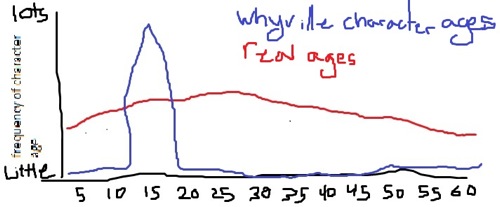
A huge percentage of the characters were 15 years old - 40% of them, in fact.
16 and 14 year old characters made up 44% together. This means a whopping 84% of every single character I looked at was either 14, 15, or 16 years old.
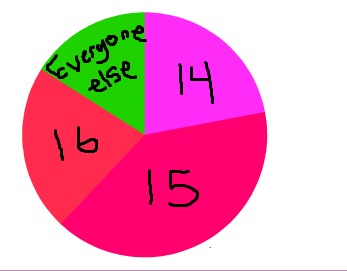
I then took all of the physical descriptions of these characters and ran them through a word cloud program. I took all references to eye color and made them one word, to clarify what the colors were referencing.
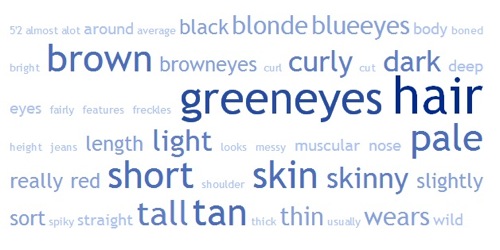
As you can see, we evidently love describing hair. Like, adore it. The only thing beside hair we love is green eyes. Nearly every single character had green eyes. Do you know what the rarest eye color is in normal groups of humans? Green. Apparently we've got ourselves an amazing selection of human beings, right here.
Anyway, judging from this your average character has green eyes, short curly brown hair, is pale, skinny, and tall.
So then I moved on to personality descriptions.
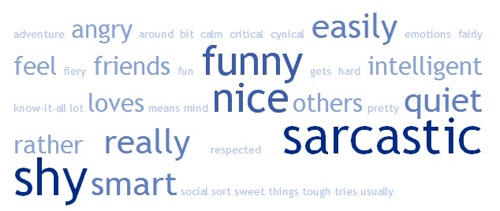
Apparently everybody is shy, sarcastic, funny, nice, quiet, and smart.
I also became curious about the physical descriptions vs. the personality descriptions - which one did people put more effort into? Well, with a little number running, I found that 77% of character descriptions used more words to describe their character's physical appearance than their emotional or mental characteristics.
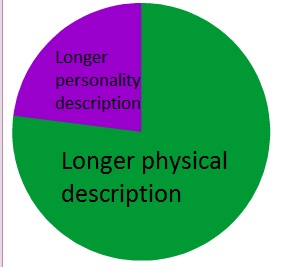
SO. The ideal character, according to Whyville RP forums, is a 15 year old girl, with curly hair, green eyes, and who's shy and sarcastic and funny. The author will use more words to go into the way she looks instead of the way she thinks, and her personality description will have a 75% chance of being overwhelmingly flattering (another statistic I didn't want to bore you with but it's slipped in there so NOW YOU KNOW).
I'd like to ask you, now - where is the originality? Where is the cigarette-smoking thirty-five year old man slouching against a dim street light while wearing a black leather jacket three sizes too big for him? Where is the slightly plump Mexican mother of four who has OCD? The old woman who thinks all her children are dead? The handsome man cleaning a spot of blood off his ironed collar?
When you meet a person for the first time, would you remember what color their eyes were the next day? Would you remember the sort of shoes they were wearing? If not, if the eyes aren't amazingly striking, if the shoes aren't completely bizarre, then don't mention it. Write down what the reader would notice if they were standing right there. You are the reader's attention. You are not there to relate every single detail that they won't remember by the next page. You remember people in impressions, not details, so give them impressions.
"The man sulked by the produce aisle, stubble darkening his jaw and a faint trail of drying mud caking off his boots. He looked my way, and I saw quick eyes, coarse lines, and a tobacco stain on the right side of his lip."
Is there any mention of eye color? Hair color? Weight? Clothing? No, nothing like that - and yet the image you get from this man is vivid. His personality, background, smell - it hits you like a wave, because the things listed in that description were the details that you would notice first.
Step 3: POTENTIAL
A good character, whether it be for a RP or for a book, is brimming with potential - and by this I mean the ability to move the plot forward. A RP or book is all about the story of it, about things happening to the characters, by the characters, with conflicts and achievements. And you want to give your characters as much potential as possible to move the plot.
Potential usually comes in two categories.
The first I call Historic Potential - this refers to elements in a character's past. These elements don't necessarily have to be active right now, but can come to light with plot developments, and in doing so move the plot along. If you have a character who was heavily involved in crime, and one of his most traumatic experiences was a hit and run involving a child - well, you've got a character who might completely freak out if he sees a kid who looks like the one he hit. PLOT MOVEMENT. Or he might completely refuse to go near the block where it happened, which foils the plans his bank robber buddies had for an escape route. PLOT COMPLICATION. And so on.
The second I call Inherent Potential - this is potential based in the inherent personality of the character. If the character is extremely motivated to achieve a goal - well, that could move the plot along faster than my butt out of the Twilight credits. If the character is cruel, then that's a villainous action that could spur other people into action. If the character has a deep-seated anger towards everybody with red hair, then boom, throw a red haired person in there and grab some popcorn.
When you create a character, create them in mind for the plot. You want stuff to happen, and you want your character to be the subject of it, the creator of it, the mover - anything. Your character must be brimming with movement. Action. Energy. Potential.
Anyway, I write this stuff because I actually care about you guys (at least for your writing), and would be thrilled if I saw any improvement, even a little, due to my efforts. Writing is incredibly fun, and can be beautiful, moving, powerful. I want you to be able to do that. I want you to be able to move people to tears. But it takes practice, thought, thick skin, and a long way to go. If any of you have any questions about writing, please don't hesitate to ask me.
-Antier
Author's Note: Here is an excellent test to determine your Mary Sue score for any given character: http://www.springhole.net/writing/marysue.htm